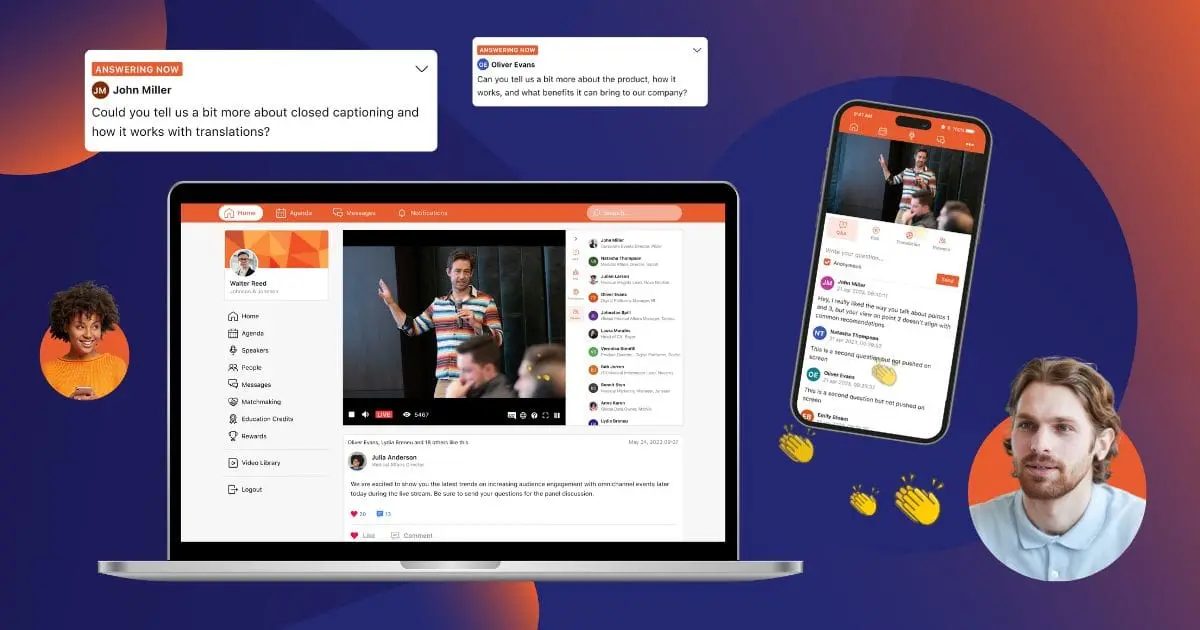The Best Virtual Event Platforms to Use for Your 2025 Event
As the world increasingly embraces digital transformation, virtual event platforms have become essential tools for hosting conferences, webinars, trade shows, and networking events. Whether you're planning a small seminar or a large-scale global conference in 2025, choosing the right platform can greatly impact the success of your event. In this article, we will highlight the best virtual event platforms available for your next event, providing key features and pricing information to help you make an informed decision. 📱💻
1. Why Virtual Event Platforms Are Essential in 2025 🌐
In 2025, virtual event platforms offer an innovative way to engage attendees and deliver content remotely. These platforms provide a seamless experience for both organizers and participants, featuring tools for live streaming, virtual networking, and exhibitor booths. Benefits of using virtual event platforms include:
- Global Reach: Virtual events can attract attendees from around the world, breaking down geographical barriers.
- Cost-Effective: Hosting an event virtually eliminates travel expenses, venue costs, and logistics.
- Sustainability: Virtual events reduce the environmental impact of physical gatherings by minimizing travel and waste.
- Enhanced Engagement: Interactive features like polls, Q&A sessions, and networking lounges enhance attendee engagement.
- Data Analytics: Track participant behavior and gather valuable insights to improve future events.
With the right platform, your virtual event can be just as impactful and engaging as an in-person experience. 🌍📈
2. Top Virtual Event Platforms for 2025 📊
Below are the best virtual event platforms in 2025, each designed to cater to various types of events and business needs:
| Platform Name | Key Features | Ideal For | Pricing |
|---|---|---|---|
| Hopin | Virtual booths, networking, live streaming, exhibitor spaces, analytics | Large-scale conferences, trade shows | Starts at $99/month |
| Zoom Events | Virtual webinars, breakout rooms, chat, live polls | Webinars, workshops, and small events | Starts at $340/month |
| Airmeet | Networking tables, interactive sessions, event lounges | Networking events, social gatherings | Starts at $99/month |
| Vimeo | High-quality streaming, custom branding, monetization options | Hybrid events, high-quality webinars | Starts at $75/month |
| Whova | Event agenda management, attendee networking, exhibitor booths | Conferences, expos, and trade shows | Starts at $499/event |
| Remo | Interactive virtual spaces, networking tables, live streaming | Workshops, networking events | Starts at $99/month |
| Brella | AI-powered matchmaking, live streaming, agenda management | Conferences and networking events | Custom pricing |
| On24 | Webinars, virtual rooms, engagement analytics, integration with marketing tools | Marketing-focused webinars and large-scale events | Custom pricing |
3. How to Choose the Right Virtual Event Platform 🤔
Selecting the best virtual event platform depends on the unique needs of your event. Here are some factors to consider when making your choice:
1. Event Type and Size 🎤
Different platforms cater to different event types. For large-scale conferences and expos, platforms like Hopin and Whova offer robust features such as exhibitor booths, interactive networking, and live streaming. For more intimate webinars or workshops, Zoom Events and Airmeet may be better suited.
2. User Experience 🖥️
A user-friendly interface is essential for both event organizers and participants. Ensure the platform you choose has an intuitive design and easy navigation. Look for platforms that offer tech support during the event to resolve any technical issues quickly.
3. Customization and Branding 🎨
If branding is a priority for your event, choose a platform that allows for extensive customization. Platforms like Vimeo and On24 offer options for customizing the event experience with your branding and logo.
4. Networking Features 🤝
For events that prioritize networking, select platforms that offer interactive features such as virtual networking tables, breakout rooms, or AI-powered matchmaking. Airmeet and Brella are excellent choices for fostering attendee interaction.
5. Pricing and Scalability 💸
Consider the scale of your event and the associated costs. Some platforms offer flexible pricing plans based on the number of attendees, while others may have fixed rates. Make sure the platform can scale to meet your event’s size and budget.
4. Benefits of Virtual Event Platforms 🎉
Using a virtual event platform comes with numerous advantages, especially in 2025:
1. Wider Audience Reach 🌏
Virtual events allow you to connect with attendees worldwide, eliminating the need for travel and accommodating global audiences. This broader reach can enhance brand visibility and generate more leads.
2. Cost Savings 💰
Hosting a virtual event eliminates venue rental, catering, and travel expenses. This cost savings can be reinvested in event marketing, technology, or speaker fees.
3. Flexibility for Attendees ⏳
Attendees can join virtual events from anywhere at their convenience, reducing scheduling conflicts. Many platforms also offer on-demand content, allowing attendees to access sessions they missed.
4. Data and Analytics 📊
Virtual event platforms provide powerful data analytics, enabling event organizers to track attendee behavior, session popularity, and engagement. These insights can help improve future events and provide valuable feedback to sponsors.
5. Tips for Running a Successful Virtual Event 📅
To make your virtual event stand out, consider these tips:
1. Engage Your Audience 🎤
Incorporate interactive features such as live polls, Q&A sessions, and chat rooms to keep attendees engaged throughout the event. The more interactive the event, the more memorable it will be for participants.
2. Provide Clear Instructions 📝
Send out detailed instructions on how to navigate the virtual event platform before the event begins. This ensures that attendees are comfortable with the platform and can make the most of the experience.
3. Test Your Technology 🔧
Conduct multiple tech checks before the event to ensure that everything runs smoothly. Test the streaming, chat features, and presentation tools to avoid technical glitches during the event.
4. Follow Up After the Event 📧
After the event, send out surveys to gather feedback and thank attendees for participating. This helps build relationships and gives you insights into how to improve future events.
Conclusion
Choosing the right virtual event platform is key to hosting a successful event in 2025. Whether you are organizing a small webinar or a large global conference, platforms like Hopin, Zoom Events, and Airmeet offer the tools you need to engage your audience and deliver a seamless experience. By considering the type of event, user experience, and key features, you can select the platform that best meets your needs. With the right platform in place, your virtual event can be a resounding success! 🚀🎉




